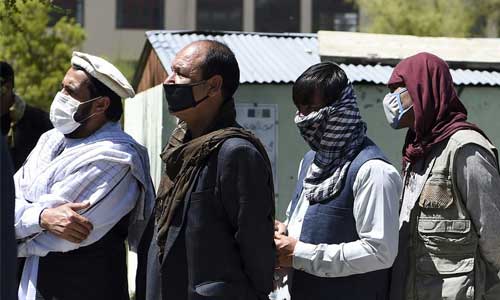After nearly two months decline in covid-19 outbreak in Afghanistan, there has been a significant increase in the number of positive cases in the past few days.
Yesterday, the ministry of public health informed of new 96 positive cases across the country while in the past two months, the highest recorded cases fell below 20 per day during August and September. However, there has been some exceptional boost such as high record of 125 positive cases on September 20. the health officials believe that the corona-virus outbreak is under control, but the daily reports shows that the statistics have steadily increased comparing to previous days and weeks.
On the other hand, the daily statistics provided by the Ministry of Public Health covers only those who go to health centers for testing while the rest remains unregistered in Afghanistan. Hence, the number of cases may be much higher than what is officially announced daily. According to a survey which earlier carried out in the country, more than ten million have been infected in Covid-19 while the official reports shows only 39 thousand positive cases. Out the ten million, the share of big cities such as Kabul, Herat, Kandahar, Balkh and Nangarhar was more than other regions. For example, more than 53% of Kabul residents became infected with the corona virus while some parts of Afghanistan were less exposed to the virus because of geographical isolation. In this regard, as the central parts of Afghanistan were more mountainous and more isolated, the villages were less affected by the virus but now It seems that the virus is invading to central parts of Afghanistan.
The outbreak of the covid-19 has also worsened the economic and psychological conditions of people throughout the country. with closing to the cold season most people do not have dry bread to survive, let alone to purchase fuels for heating homes or provide medicine and nutritious food for the second wave of the covid-19 whereas the goods’ prices are dramatically increase in winter in free market of the country. As a result of, growing pressure it is said that a large number of Afghan people have tendencies to self immolation due to the economic and psychological conditions combined with insecurity and disappointment about future. If the second wave of the corona becomes serious, it could farter complicate the situation as it is too hard for the poverty stricken people to carry the burden of disease, war poverty and high prices at the same time.
According to the World Health Organization’s assessment from Afghanistan, the risk of the virus is still serious and the second wave is likely to spread. Similarly, the scientific reports shows that warm weather reduced corona-virus spread by 20% while the cooler and drier weather helps the virus linger on surfaces longer. Thus, the virus spreads much better in inside closed spaces while out in open environment it is easily swept away with a breeze or is damaged by the sun. therefore, many developed countries which were successful in fighting against the first catastrophic wave, are preparing to deal with the next waves of corona-virus in the cold season and they are deeply concerned about this issue. This issue could be a far greater challenge than any other country in Afghanistan because of being less developed and have weak health system. According to experts, we may face three challenges during the winter including air pollution, seasonal flu, and the corona-virus. So, if these factors are combined, the vulnerability of the citizens will increase.
Despite abovementioned concerns, the citizens and health institutions belittle the upcoming risks. Many citizens think that the corona danger is ended in the country and so are reckless about the corona-virus and do not follow the health recommendations during daily businesses and inside educational centers.
They behave in a way that do not show any compliance with health protocols. Gathering, traveling and socializing are like pre-Corona times. Observing social distance and using a mask is completely forgotten while as above said the risk of second wave of covid-19 is still serious in Afghanistan.
This is also the experience of other countries that after a slight improvement in the situation, they experience more difficult days because the levels of antibodies decline in two to three months after the first infection. Medical studies shows that people produce a reasonable antibody response to the virus, but it is waning over a short period of time depending on how high the peak was determines how long the antibodies would staying around. So, the negligence can be catastrophic in countries like Afghanistan.
Although it is not possible to isolate all people at homes, it is possible to raise health awareness and enforce health regulations such as using masques, maintaining social distance, washing hands and so on. If the current recklessness continue until next cold months, there might be dreadful crisis in the country. In order to overcome all the above mentioned issues, the government needs to seek help from other countries and seriously warn the people about the danger of the second wave so as not to repeat the chaotic condition of the first wave. Otherwise, the persistence of negligence can cause a bigger disaster than the first round. Both the citizens and the government should not forget the hard days of two months ago when the government was not even able to provide oxygen to the patients and helpless to save the lives of the people. the citizens were knocking on every door to provide oxygen to rescue their beloved ones. If the government fall short due any reason or limitations, the citizens should not forget the hard days of two months ago.
Home » Opinion » The Cold Season is Beginning with Rise of Corona-Virus and Poverty in Afghanistan
The Cold Season is Beginning with Rise of Corona-Virus and Poverty in Afghanistan
| Mohammad Zahir Akbari

